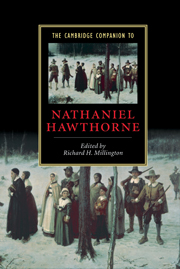Book contents
- Frontmatter
- Introduction
- 1 Hawthorne’s Labors In Concord
- 2 Hawthorne as cultural theorist
- 3 Hawthorne and American masculinity
- 4 Hawthorne and the question of women
- 5 Hawthorne, modernity, and the literary sketch
- 6 Hawthorne’s American history
- 7 Hawthorne and the writing of childhood
- 8 Love and politics, sympathy and justice in The Scarlet Letter
- 9 The marvelous queer interiors of The House of the Seven Gables
- 10 Sympathy and reform in The Blithedale Romance
- 11 Perplexity, sympathy, and the question of the human: a reading of The Marble Faun
- 12 Whose Hawthorne?
- Selected bibliography
- Index
- Series list
2 - Hawthorne as cultural theorist
Published online by Cambridge University Press: 28 May 2006
- Frontmatter
- Introduction
- 1 Hawthorne’s Labors In Concord
- 2 Hawthorne as cultural theorist
- 3 Hawthorne and American masculinity
- 4 Hawthorne and the question of women
- 5 Hawthorne, modernity, and the literary sketch
- 6 Hawthorne’s American history
- 7 Hawthorne and the writing of childhood
- 8 Love and politics, sympathy and justice in The Scarlet Letter
- 9 The marvelous queer interiors of The House of the Seven Gables
- 10 Sympathy and reform in The Blithedale Romance
- 11 Perplexity, sympathy, and the question of the human: a reading of The Marble Faun
- 12 Whose Hawthorne?
- Selected bibliography
- Index
- Series list
Summary
Over the past couple of decades, many scholars have reread American authors and their literature as complicit carriers of capitalist, imperialist, nationalist, class, gender, ethnoracial, and sexual ideologies. This critical emphasis on literature's ideological relations to the reproduction of social contradictions has placed literary studies in a more provocative dialogue with cultural theory. In developing this dialogue, it is equally important to recognize that American authors have from the get-go been among America's most complex, self-reflexive, daring, and artful cultural theorists. When critics grant many of these authors and their fictions the credit they deserve, it is easier to see that their creative insights contribute much to modern understandings of the workings - and political possibilities - of culture.
I owe a special debt to Nathaniel Hawthorne for inspiring me to think about such matters, for my earliest readings of his work led me to value American literature as a theoretical resource.1 In his “Custom House” preface to The Scarlet Letter (1850) Hawthorne punned on “customs” when he portrayed himself as a Surveyor of Customs. The term describes not only the government post he held in the Salem Custom House, but also a key aspect of his role as a writer who critically surveyed his culture’s customs, habits of seeing and feeling, and patterns of making significance. Hawthorne learned – and unlearned – much through his narratives, allegories, and anti-allegories of culture, contradiction, and meaning production. To clarify my appreciation of Hawthorne’s power as a cultural theorist, I offer here some brief analyses of his fictions. What I consider, however, is partial – by no means the whole story, or stories.
- Type
- Chapter
- Information
- The Cambridge Companion to Nathaniel Hawthorne , pp. 35 - 59Publisher: Cambridge University PressPrint publication year: 2004
- 4
- Cited by



